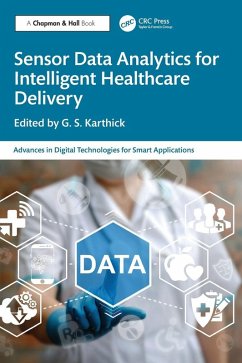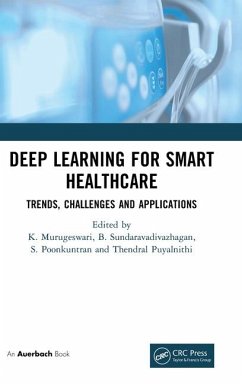
Gebundenes Buch
Dimensions of Intelligent Analytics for Smart Digital Health Solutions
Versandkostenfrei!
Versandfertig in 1-2 Wochen

PAYBACK Punkte
80 °P sammeln!




This title demystifies AI and analytics, upskilling individuals (healthcare professionals, hospital managers, consultants, researchers, students, and the population at large) around analytics and AI as it applies to healthcare.
Nilmini Wickramasinghe is the Professor and Optus Chair of Digital Health at La Trobe University. In addition, she is the inaugural Professor and Director of Health Informatics Management at Epworth HealthCare. She also holds honorary research professor positions at the Peter MacCallum Cancer Centre, Murdoch Children's Research Institute (MCRI), and Northern Health. After completing ¿ve degrees at the University of Melbourne, she earned a PhD at Case Western Reserve University, Cleveland, Ohio, USA, and later completed the executive education at Harvard Business School, Harvard University, Cambridge, Massachusetts, USA, in value-based healthcare. For over 25 years, Professor Wickramasinghe has been actively researching and teaching within the health informatics/digital health domain in the United States, Germany and Australia, with a particular focus on designing, developing and deploying suitable models, strategies and techniques grounded in various management principles to facilitate the implementation and adoption of technology solutions to e¿ect superior, value-based patient-centric care delivery. Professor Wickramasinghe collaborates with leading scholars at various premier healthcare organizations and universities throughout Australasia, the United States and Europe and is well published, with more than 400 referred scholarly articles, more than 15 books, numerous book chapters, an encyclopaedia and a well-established funded research track record securing over $25M in funding from grants in the United States, Australia, Germany and China as a chief investigator. She holds a patent around analytics solutions for managing healthcare data and is the editor-in-chief of the International Journal of Networking and Virtual Organisations (www.inderscience.com/ijnvo) as well as the editor of the Springer book series Healthcare Delivery in the Information Age. In 2020, she was awarded the prestigious Alexander von Humboldt award for outstanding contribution to digital health, the ¿rst time this honour has been bestowed to someone in the discipline of digital health. Freimut Bodendorf earned a degree in computer science at the School of Engineering, University of Erlangen-Nuremberg. He also earned a PhD in information systems. Subsequently, he was head of an IS Department at the University Hospital and Medical School at the University of Freiburg, Germany; professor at the Postgraduate School of Engineering in Nuremberg, Germany; and head of the Department of Computer Science and Information Systems at the University of Fribourg, Switzerland. He also is the head of the research group Management Intelligence Systems of the Institute of Information Systems at the University of Erlangen-Nuremberg. He is a faculty member of the School of Business and Economics as well as the School of Engineering and the School of Natural Sciences. Recently he was appointed to be a Research Fellow of the Fraunhofer Institute IIS, the largest institute in Germany. His scienti¿c work focuses on business intelligence and digital health, including advanced data analytics, responsible arti¿cial intelligence, intelligent assistance, data sharing and federated learning ecosystems. His research projects investigate and create solutions in the ¿elds of digital transformation in healthcare and digital support of individual wellness. Mathias Kraus is an Assistant Professor for Data Analytics at the Institute for Information Systems, FAU Erlangen-Nürnberg, where he also heads the White-Box AI research group. Prior to this appointment, he was a research assistant at ETH Zurich and the University of Freiburg. In his current role, he develops advances in data analytics with a focus on transparency and reliability in machine learning models. He has made several contributions to the scienti¿c community through his work, which has been published in leading information systems and operations research journals and at prestigious computer science conferences.
Produktdetails
- Verlag: Chapman and Hall/CRC
- Seitenzahl: 450
- Erscheinungstermin: 1. März 2024
- Englisch
- Abmessung: 240mm x 161mm x 29mm
- Gewicht: 837g
- ISBN-13: 9781032699738
- ISBN-10: 1032699736
- Artikelnr.: 69484184
Herstellerkennzeichnung
Libri GmbH
Europaallee 1
36244 Bad Hersfeld
gpsr@libri.de
Für dieses Produkt wurde noch keine Bewertung abgegeben. Wir würden uns sehr freuen, wenn du die erste Bewertung schreibst!
Eine Bewertung schreiben
Eine Bewertung schreiben
Andere Kunden interessierten sich für













